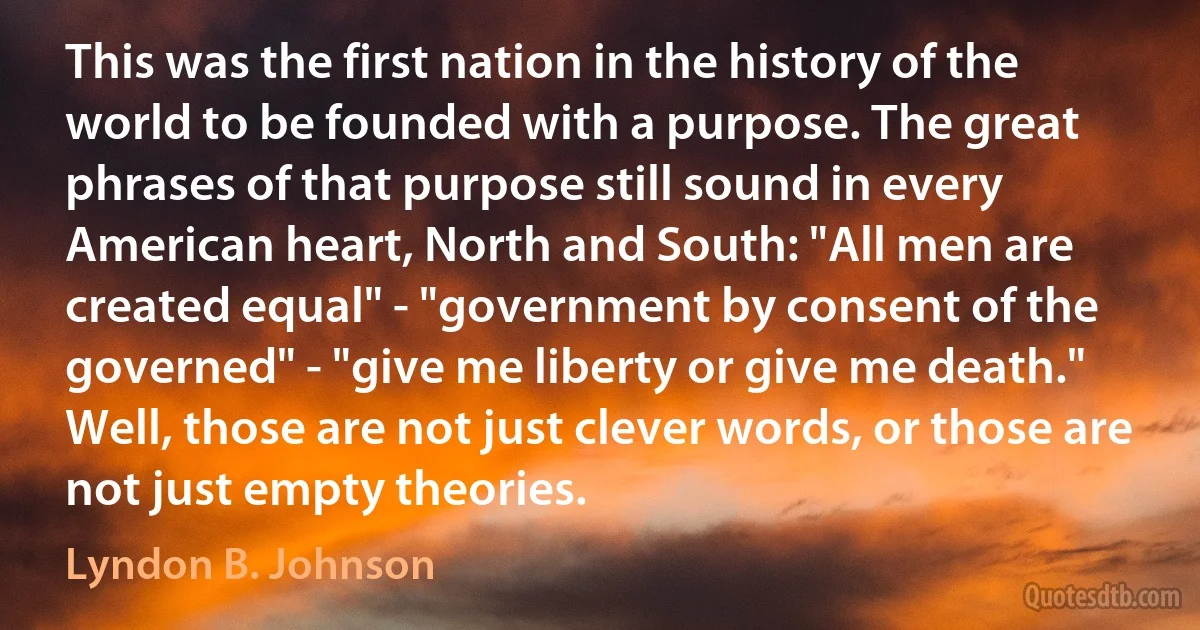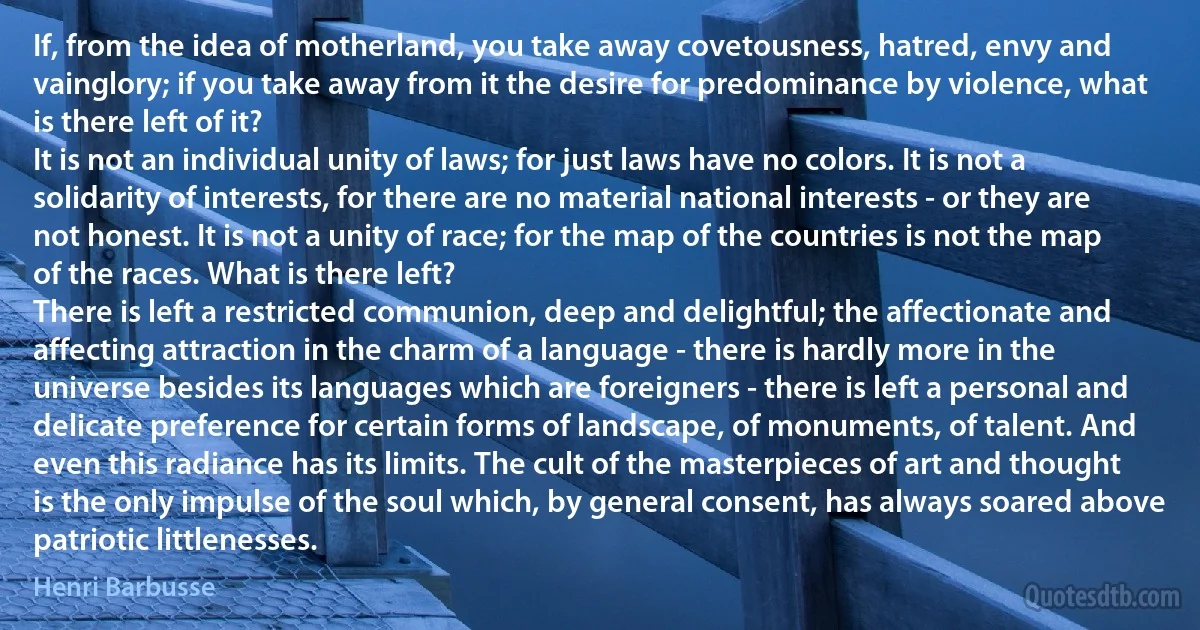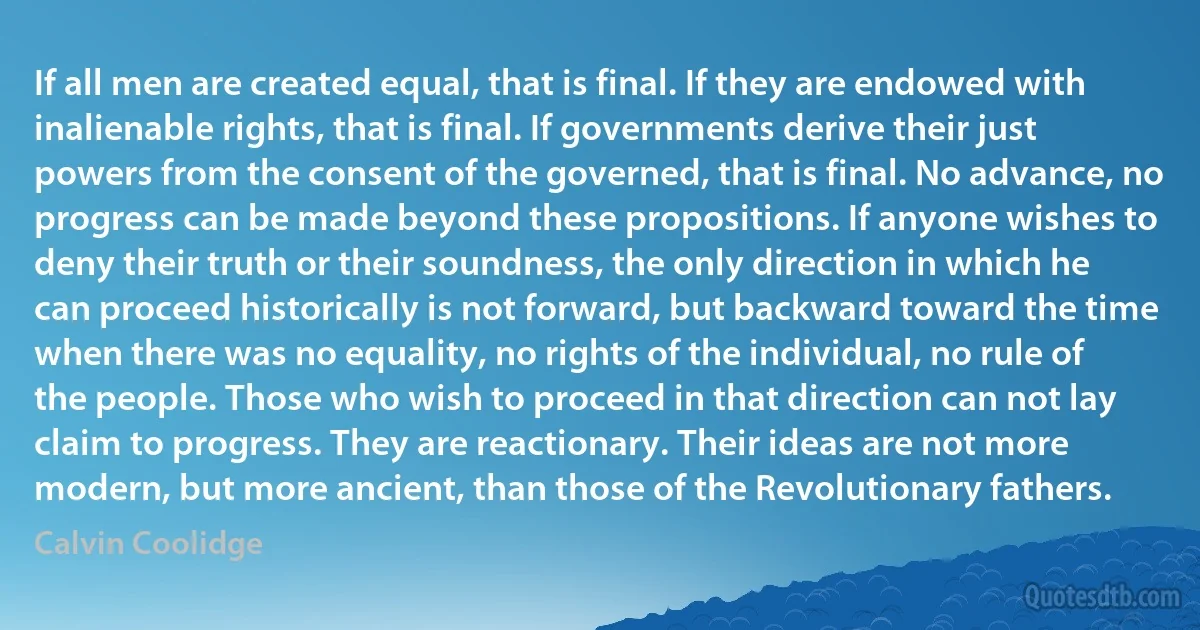Consent Quotes - page 15
The demons start the warfare in the imagination; they cultivate it with thoughts; they defile the nous, they take it down into the heart; and they make both the soul and the body filthy. What decides a person's entire progress or failure is whether he gives in to or resists the attacks of the imagination. If he makes the mistake of beginning a dialogue with the sinful assault and accepting the devil's garbage by his own consent, what will follow are falls of the sould, mind, heart, and body. As a result, the passion will take him captive.

Seraphim Rose
That policy is directed to two main objects-first, that we should clearly make known to the peoples of the belligerent States, not in vague but in definite terms, that our purpose is not conquest but conciliation, not humiliation but friendship and freedom; and in the second place, that these terms should include the re-settlement in their homes of the burghers, who by capture or the operations of war have been dispossessed, and the establishment, as soon as order is restored, of free self-governing institutions... If we are to maintain the political supremacy of the British power in South Africa-and this surely is the end and purpose of all we are doing-it can only be by conciliation and friendship; it will never be by domination and ascendancy, because the British power cannot there or elsewhere rest securely unless it rests upon the willing consent of a sympathetic and contented people.

Henry Campbell-Bannerman
Third will be Senator Mack's amendment on the role of the States. We oppose his position, and we are supported by the Governors, as well as the heads of the State agencies dealing with education. We hope that the Senate will reject this amendment. Next will be the Helms amendment requiring parental consent for distribution or provision of condoms or other contraceptive devices or drugs or information about contraception. We recommend voting no, and instead we hope that the Senate will support an amendment which Senator Jeffords and I have offered restating the law which has been in effect since 1981, which involves parents to the extent possible. So we will vote on the Helms amendment first and then on the amendment which Senator Jeffords and I have offered.

Ted Kennedy
The transfer of the allegiance and citizenship, of no small part of the heart and life, of human beings from one sovereignty to another, without any reference to their own consent, has been a great reproach to some former transactions in Europe; has led to many wars and disturbances; is hard to reconcile with considerations of equity; and is repulsive to the sense of modern civilization.

William Ewart Gladstone
[M]en must be governed by those laws which they love. Where thirty millions are to be governed by a few thousand men, the government must be established by consent, and must be congenial to the feelings and to the habits of the people. That which creates tyranny is the imposition of a form of government contrary to the will of the governed: and even a free and equal plan of government, would be considered as despotic by those who desired to have their old laws and their ancient system.

Edmund Burke
Al-Buraq to Earth. Contact made. Kamal, onboard computer, setting up link between (1) mind of mixed-species hominid on Planet Earth, and (2) cortico helmet of Captain Jul. Scanning planet for mixed-species hominid. One mixed-species hominid identified. Name: Yakoub Islam. Consent obtained. Link established with Yakoub's mind.
Set up complete.

Yakoub Islam
In their own internal functioning too, the AAR scholars and Indologists don't put a premium on the freedom to express dissident opinions. Here I speak from experience, having been banned from several forums where Wendy Doniger and some of her prominent supporters were present and gave their tacit consent. The most high-profile target of this policy has probably been Rajiv Malhotra, a sharp critic of Indologist mores and anti-Hindu bias, some of whose experiences in this regard have been fully documented... Briefly: while everything pleads against this act of book-burning, the American India-watchers are not very entitled to their much-publicized indignation... To an extent this is simply true, there is no level playing field, and the American academics including Wendy Doniger herself have done their best never to give the Hindus a fair hearing....

Koenraad Elst
When men enter into society, it is by voluntary consent; and they have a right to demand and insist upon the performance of such conditions and previous limitations as form an equitable original compact. Every natural right not expressly given up, or, from the nature of a social compact, necessarily ceded, remains. All positive and civil laws should conform, as far as possible, to the law of natural reason and equity.

Samuel Adams
Property is admitted to have an existence, even in the savage state of nature. The bow, the arrow, and the tomahawk; the hunting and the fishing ground, are species of property, as important to an American savage, as pearls, rubies, and diamonds are to the Mogul, or a Nabob in the East, or the lands, tenements, hereditaments, messuages, gold and silver of the Europeans. And if property is necessary for the support of savage life, it is by no means less so in civil society. The Utopian schemes of levelling, and a community of goods, are as visionary and impracticable, as those which vest all property in the Crown, are arbitrary, despotic, and in our government unconstitutional. Now, what property can the colonists be conceived to have, if their money may be granted away by others, without their consent?

Samuel Adams
The Hindus criticise the Mahomedans for having spread their religion by the use of the sword. They also ridicule Christianity on the score of the Inquisition.But really speaking, who is better and more worthy of our respect-the Mahomedans and Christians who attempted to thrust down the throats of unwilling persons what they regarded as necessary for their salvation, or the Hindu who would not spread the light, who would endeavour to keep others in darkness, who would not consent to share his intellectual and social inheritance with those who are ready and willing to make it a part of their own make-up? I have no hesitation in saying that if the Mahomedan has been cruel, the Hindu has been mean; and meanness is worse than cruelty.

Bhimrao Ramji Ambedkar
The North is fighting for no sentimental cause-for no victory of a 'higher civilization'. It is fighting for a very ancient and vulgar object of war-for that which Russia has secured in Poland-that which Austria clings to in Venetia-that which Napoleon sought in Spain. It is a struggle for empire, conducted with a recklessness of human life which may have been paralleled in practice, but has never been avowed with equal cynicism. If any shame is left in the Americans, the first revision they will make in their constitution will be to repudiate formally the now exploded doctrine laid down in the Declaration of Independence, that 'Governments derive their just powers from the consent of the governed'.

Robert Gascoyne-Cecil, 3rd Marquess of Salisbury
[The third principle of British democracy was that national sovereignty belonged to the people.] We lend it to our representatives to use for five years at a time. ... Any Government or MP pretending to give away these sovereign powers without the explicit consent of the people is acting unconstitutionally. Laws that pretend to take away these powers permanently have no moral authority. ... [Heath's government] will fail because they are trying to act contrary to centuries of British tradition. The people will not have it. But the resistance that is building up is not, in any sense, revolutionary.

Tony Benn
In his old age he [Thales] received by common consent the title of sophos, or sage; and when Greece came to name its Seven Wise Men it placed Thales first. Being asked what was very difficult, he answered, in a famous apophthegm, "To know thyself.” Asked what was very easy, he answered, "To give advice.” To the question, what is God? he replied, "That which has neither beginning nor end.” Asked how men might live most virtuously and justly, he answered, "If we never do ourselves what we blame in others.”.

Will Durant
The rights of men to the use of land are not joint rights: they are equal rights.
Were there only one man on earth, he would have a right to the use of the whole earth or any part of the earth.
When there is more than one man on earth, the right to the use of land that any one of them would have, were he alone, is not abrogated: it is only limited. The right of each to the use of land is still a direct, original right, which he holds of himself, and not by the gift or consent of the others; but it has become limited by the similar rights of the others, and is therefore an equal right.

Henry George
Speaking generally, he holds dominion, to whom are entrusted by common consent affairs of state - such as the laying down, interpretation, and abrogation of laws, the fortification of cities, deciding on war and peace, &c. But if this charge belong to a council, composed of the general multitude, then the dominion is called a democracy; if the council be composed of certain chosen persons, then it is an aristocracy ; and, if, lastly, the care of affairs of state, and, consequently, the dominion rest with one man, then it has the name of monarchy.

Baruch Spinoza
True, the law is sacred to the bourgeois, for it is his own composition, enacted with his consent, and for his benefit and protection. He knows that, even if an individual law should injure him, the whole fabric protects his interests; and more than all, the sanctity of the law, the sacredness of order as established by the active will of one part of society, and the passive acceptance of the other, is the strongest support of his social position. Because the English bourgeois finds himself reproduced in his law, as he does in his God, the policeman's truncheon which, in a certain measure, is his own club, has for him a wonderfully soothing power. But for the working-man quite otherwise! The working-man knows too well, has learned from too oft-repeated experience, that the law is a rod which the bourgeois has prepared for him; and when he is not compelled to do so, he never appeals to the law.

Friedrich Engels
When you see that trading is done, not by consent, but by compulsion-when you see that in order to produce, you need to obtain permission from men who produce nothing-when you see that money is flowing to those who deal, not in goods, but in favors-when you see that men get richer by graft and by pull than by work, and your laws don't protect you against them, but protect them against you-when you see corruption being rewarded and honesty becoming a self-sacrifice-you may know that your society is doomed.

John Galt
To fathers within their private families Nature hath given a supreme power; for which cause we see throughout the world even from the foundation thereof, all men have ever been taken as lords and lawful kings in their own houses. Howbeit over a whole grand multitude having no such dependency upon any one, and consisting of so many families as every politic society in the world doth, impossible it is that any should have complete lawful power, but by consent of men, or immediate appointment of God; because not having the natural superiority of fathers, their power must needs be either usurped, and then unlawful; or, if lawful, then either granted or consented unto by them over whom they exercise the same, or else given extraordinarily from God, unto whom all the world is subject.

Richard Hooker
[O]f Law there can be no less acknowledged, than that her seat is the bosom of God, her voice the harmony of the world: all things in heaven and earth do her homage, the very least as feeling her care, and the greatest as not exempted from her power: both Angels and men and creatures of what condition soever, though each in different sort and manner, yet all with uniform consent, admiring her as the mother of their peace and joy.

Richard Hooker
The constitution gives the president the power to nominate and the Senate the authority to provide advice and consent on supreme court nominees. Accordingly, I intend to follow the constitution and precedent in considering the president's nominee. If the nominee reaches the Senate floor, I intend to vote based upon their qualifications.

Mitt Romney



